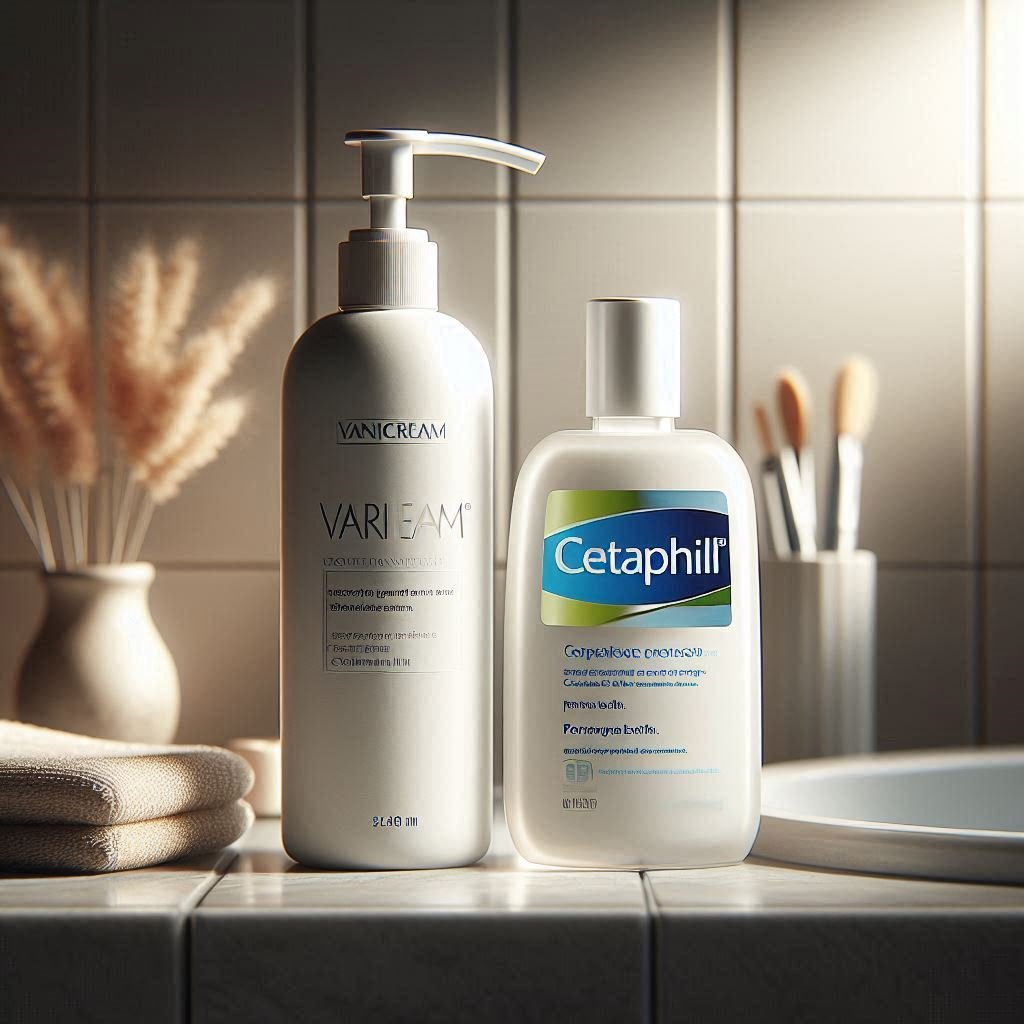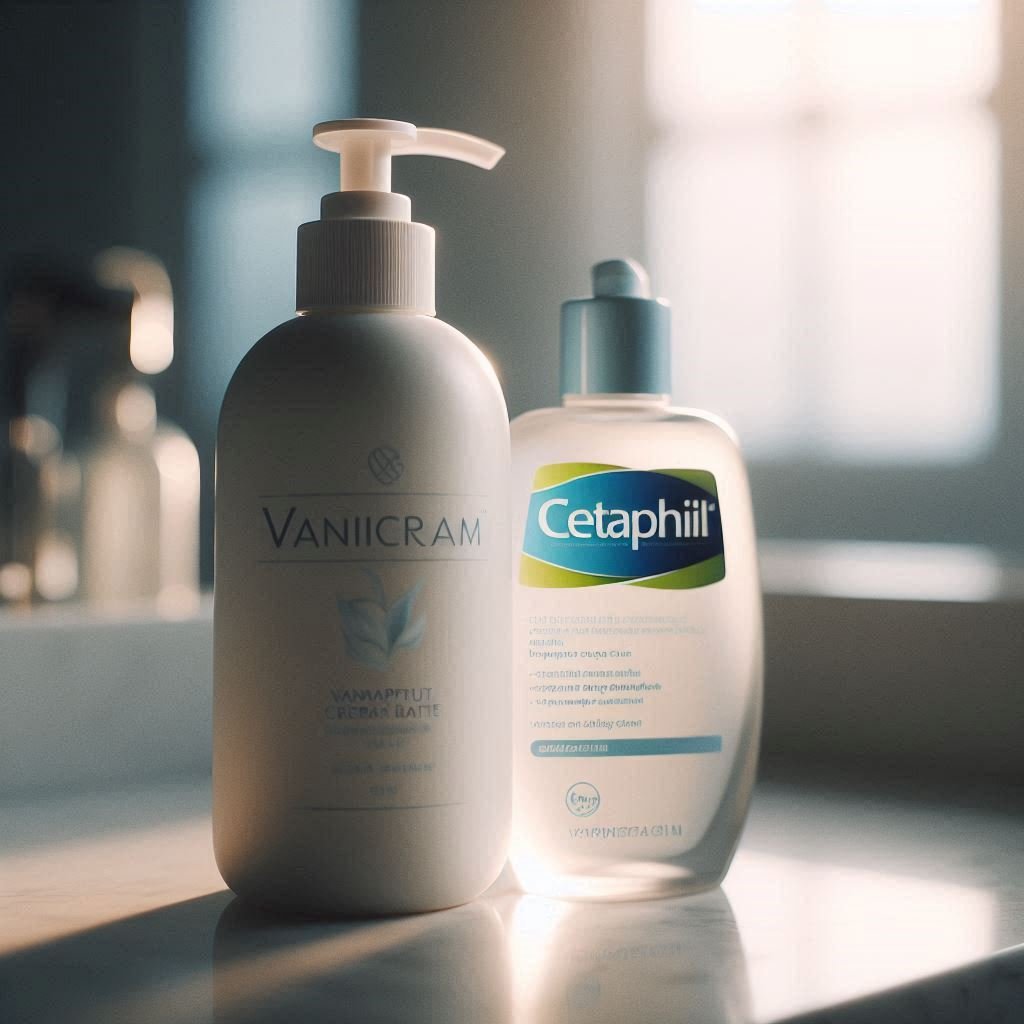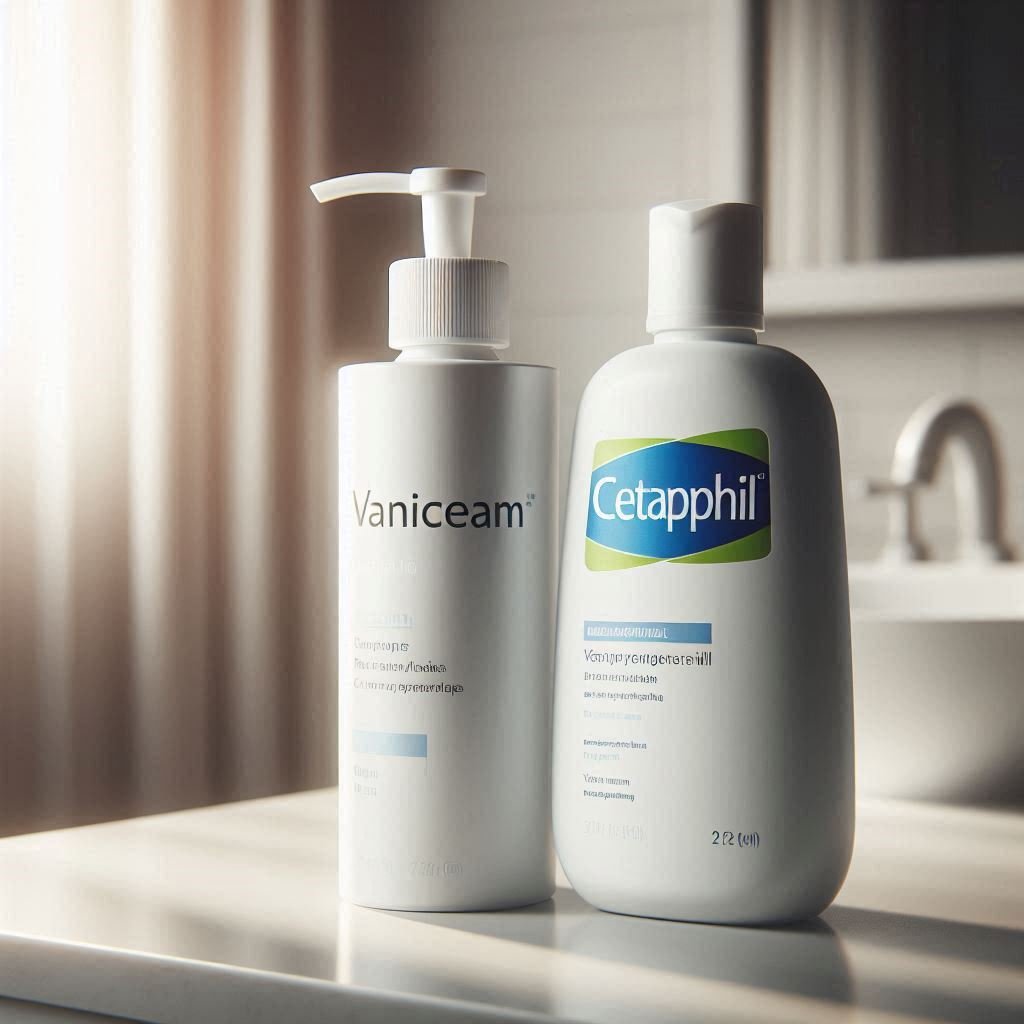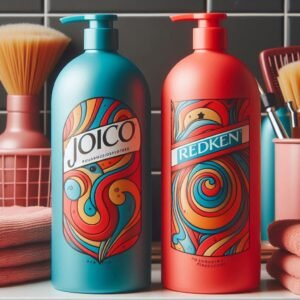Vanicream Vs Cetaphil 2024 – As you navigate the crowded skincare market, you’re likely to come across two familiar names: Vanicream and Cetaphil. Both are touted as gentle and effective, but which one truly lives up to the hype?
With so many similarities, it’s easy to get caught up in the noise. But, what if you could finally cut through the confusion and get to the heart of what really matters?
From ingredients to user reviews, we’re about to uncover the nitty-gritty details that’ll help you make an informed decision. But first, let’s start with the most pressing question: what sets these two skincare giants apart?
A Quick Overview

- Vanicream’s formula features petrolatum, ceramides, and hyaluronic acid for intense moisturizing, while Cetaphil’s formula is gentler with glycerin, panthenol, and sweet almond oil.
- Vanicream excels in water retention, providing longer-lasting hydration and a more radiant appearance, whereas Cetaphil offers subtle hydration suitable for oily skin.
- Both products are fragrance-free and non-comedogenic, making them suitable for sensitive skin, but Vanicream’s formula is more intense and may be better for dry skin.
- The pH levels of both products are close to the skin’s natural pH, but Vanicream’s is slightly more alkaline, which may affect skin tolerance.
- Both products receive high user ratings, with Vanicream praised for its moisturizing abilities and Cetaphil for its rich, creamy texture.
Key Ingredients Comparison
When deciding between Vanicream and Cetaphil, you’ll want to examine the key ingredients in each product, as they can substantially impact your skin’s response.
Chemical reactions between ingredients can either soothe or irritate your skin.
Vanicream’s formula features petrolatum, ceramides, and hyaluronic acid, which work together to repair and lock in moisture.
Cetaphil, on the other hand, contains glycerin, panthenol, and sweet almond oil, which help to hydrate and calm the skin.
It’s crucial to weigh how these ingredients interact with your skin type and concerns.
For instance, if you have acne-prone skin, you may want to opt for Vanicream’s non-comedogenic formula.
Moisturizing Properties Evaluated

As you consider the moisturizing properties of Vanicream and Cetaphil, you’re likely wondering which one will provide the best hydration for your skin.
You’ll want to know how these products compare with regard to hydrating power, and which one can lock in moisture more effectively.
In this section, we’ll break down the moisturizing abilities of each product, so you can make an informed decision.
Hydrating Power Compared
You’re likely wondering which product reigns supreme concerning hydrating power, and that’s exactly what we’re about to explore.
When it comes to hydrating your skin, both Vanicream and Cetaphil are known for their moisturizing properties.
However, Vanicream takes the lead as regards water retention, allowing your skin to hold moisture for longer periods.
This results in skin plumpness, giving your skin a more radiant and youthful appearance.
Cetaphil, on the other hand, provides a more subtle hydration that’s still effective but not as intense.
If you have dry or dehydrated skin, Vanicream’s hydrating power might be the better choice.
But if you have oily skin, Cetaphil’s gentle hydration might be more suitable.
Moisture Locking Ability
Both Vanicream and Cetaphil boast impressive moisturizing properties, but their ability to lock in moisture differs substantially, with Vanicream forming a more impermeable barrier that prevents moisture loss for an extended period.
As you consider which product is right for you, crucial to weigh is evaluating their moisture locking ability.
Moisture retention
Vanicream’s unique blend of ceramides and hyaluronic acid helps to retain moisture in the skin for up to 24 hours, while Cetaphil’s formula, although hydrating, doesn’t quite match this level of retention.
Barrier function
Vanicream’s impermeable barrier helps to prevent moisture loss, reducing the appearance of fine lines and wrinkles. Cetaphil’s formula, while gentle, doesn’t provide the same level of barrier protection.
Long-term benefits
With Vanicream, you can expect long-term benefits, such as improved skin elasticity and firmness, thanks to its exceptional moisture locking ability.
Fragrance-Free Formulas Explained

As you consider the differences between Vanicream and Cetaphil, understanding what ‘fragrance-free’ really means is crucial.
You’ll soon discover that fragrance-free formulas can be a game-changer for your skin, offering benefits that can make a significant impact on your skin health.
Let’s break down the key aspects of fragrance-free formulas, including what they are, how they can help your skin, and the importance of key ingredients.
What Is Fragrance-Free
Fragrance-free formulas, a staple in sensitive skin care, eliminate artificial scents and masking agents that can irritate your skin.
You might think that fragrances are just a nice-to-have, but for those with scent sensitivity, they can be a major skin irritant. Don’t believe the fragrance myths – just because a product smells good doesn’t mean it’s good for your skin.
- They don’t contain masking agents: These agents can temporarily cover up unpleasant odors, but they can also exacerbate skin issues.
- They’re not the same as ‘unscented’: While unscented products may still contain fragrances, fragrance-free products have been specifically formulated to avoid them.
- They’re a game-changer for sensitive skin: By eliminating fragrances, you can reduce the risk of irritation and create a more balanced skin care routine.
Benefits for Skin
You can experience a significant reduction in skin irritation and allergic reactions by switching to fragrance-free formulas, which are specifically designed to minimize the risk of adverse reactions.
By choosing fragrance-free products, you’re giving your skin a break from harsh chemicals that can disrupt its natural balance.
This, in turn, allows your skin to focus on its natural renewal process, resulting in a more even-toned and radiant complexion.
Additionally, fragrance-free formulas can help improve skin elasticity, making your skin look more youthful and supple.
Key Ingredients Matter
When it comes to fragrance-free formulas, the presence of certain key ingredients is essential in maintaining the skin’s natural barrier function and mitigating irritation.
These ingredients play a pivotal role in supporting your skin chemistry.
Glycerin: A natural humectant that attracts and retains moisture, helping to soothe dryness and irritation.
Ceramides: These lipid molecules help repair and restore the skin’s natural barrier, reducing inflammation and improving skin elasticity.
Hyaluronic Acid: A powerful hydrator that can hold up to 1,000 times its weight in water, providing intense moisturization and plumping the skin.
Non-Comedogenic Claims Investigated
Vanicream and Cetaphil proudly claim to be non-comedogenic, meaning they won’t clog your pores, but what do these claims really mean, and can they be trusted?
In the world of cosmetics, ‘non-comedogenic’ is a term that’s largely self-regulated, with no strict labeling regulations governing its use. This means that cosmetic standards can vary greatly between brands.
While some may conduct rigorous testing to verify their products won’t clog pores, others may not. To guarantee a clear understanding of what you’re putting on your skin, you must examine the ingredients and formulation beyond the label.
As you weigh your options between Vanicream and Cetaphil, remember that a non-comedogenic claim is just the starting point for your research.
Skin Type Suitability Analysis
As you consider the suitability of Vanicream and Cetaphil for your skin, crucially, you must think about your specific skin type needs.
If you have normal skin, you’re likely looking for a product that maintains balance and hydration.
But if you have dry or sensitive skin, you’ll want to pay close attention to how these products address your unique concerns.
Normal Skin Needs
You likely have normal skin if your complexion is balanced, neither too oily nor too dry, and you’re probably wondering which moisturizer is best suited for your skin type.
With normal skin, you’re in luck – you can focus on maintaining your skin’s natural pH balance and tone.
Skin pH: Look for a moisturizer that’s formulated to work in harmony with your skin’s natural pH level, which is slightly acidic.
Skin tone: If you have a neutral skin tone, you can opt for a moisturizer that won’t alter your complexion.
Moisturizing level: You’ll want a moisturizer that provides the right amount of hydration without leaving your skin feeling greasy or dry.
Dry Skin Concerns
Dry skin demands a moisturizer that can provide intense hydration and help repair the skin’s natural barrier, and that’s where Vanicream and Cetaphil‘s formulations come into play.
When you have dry skin, you know how harsh winter struggles can be, with flaky, tight skin that’s desperate for relief.
Both Vanicream and Cetaphil offer products that can help you overcome these winter struggles by providing long-lasting hydration and supporting skin renewal.
Vanicream’s rich, non-comedogenic moisturizers are designed to lock in moisture, while Cetaphil’s gentle, fragrance-free formulas help to repair and restore the skin’s natural barrier.
Sensitive Skin Issues
When it comes to sensitive skin, choosing the right moisturizer is critical, as even the gentlest formulas can still cause irritation if they’re not specifically designed for your skin type.
You know how frustrating it can be to deal with skin triggers that lead to unwanted skin reactions.
To avoid this, you need to be mindful of the ingredients and formulations that can exacerbate your sensitivities.
Three common skin triggers to watch out for:
- Harsh fragrances: Artificial scents can be a major skin irritant, so look for fragrance-free or hypoallergenic options.
- Comedogenic ingredients: Ingredients like mineral oil and petrolatum can clog pores and cause breakouts, making them a no-go for sensitive skin.
- Artificial dyes: Some artificial dyes can cause skin reactions, so opt for products with natural colorants or no dyes at all.
Product Texture and Consistency
Both Vanicream and Cetaphil moisturizers boast a rich, non-greasy texture that absorbs quickly into the skin, making them ideal for daily use.
When you apply these moisturizers, you’ll notice a silky smoothness that glides effortlessly onto your skin.
The whipped creaminess of these products is a game-changer, providing long-lasting hydration without clogging your pores.
You’ll love how they leave your skin feeling soft, supple, and nourished.
The lightweight consistency of both Vanicream and Cetaphil makes them perfect for layering under makeup or wearing on their own.
Whether you have normal, dry, or oily skin, these moisturizers will provide the right amount of hydration without feeling heavy or greasy.
Soothing Sensitive Skin Benefits
You can rely on both Vanicream and Cetaphil to provide a comforting shield of protection for sensitive skin, calming irritation and redness with their gentle, non-irritating formulas. These products understand your skin’s unique needs, offering a sense of skin comfort that’s hard to find elsewhere.
Both products are fragrance-free, reducing the likelihood of allergic reactions and skin irritation.
They provide long-lasting hydration, helping to calm and comfort dry, sensitive skin.
Their formulas feature gentle, non-comedogenic ingredients that won’t clog pores or exacerbate sensitive skin issues.
Anti-Inflammatory Properties Compared
Both Vanicream and Cetaphil boast potent anti-inflammatory properties that work to reduce skin inflammation, with Vanicream’s unique blend of ingredients targeting redness and swelling more aggressively.
As you explore these products, you’ll find that Vanicream’s formulation is particularly effective in reducing inflammation, making it an excellent choice for sensitive skin.
Cetaphil, on the other hand, takes a more gentle approach, providing a soothing barrier that calms and comforts the skin.
When it comes to inflammation reduction, Vanicream takes the lead, but Cetaphil is no slouch either.
Both products offer impressive skin soothing capabilities, making them suitable for everyday use.
Hydrating Properties and Humectants
Your skin’s hydration levels can greatly impact its overall health, and that’s where the hydrating properties and humectants in Vanicream and Cetaphil come into play.
Both products are designed to provide a moisture boost, but they differ in their approach.
Moisture lock-in: Both Vanicream and Cetaphil contain humectants that help lock in moisture, leaving your skin feeling soft and supple.
Hydration levels: Vanicream’s rich, creamy texture provides an intense hydration boost, while Cetaphil’s lightweight formula provides a gentle, non-greasy hydration.
Moisture retention: Both products help retain moisture in the skin, reducing the appearance of fine lines and wrinkles and leaving your skin looking healthy and radiant.
Product Ph Levels and Skin Impact
The pH levels of Vanicream and Cetaphil can substantially impact your skin’s natural barrier function and overall health.
When a product’s pH is too alkaline or acidic, it can disrupt your skin’s natural pH balance, leading to irritation, dryness, or even skin conditions like eczema.
Both Vanicream and Cetaphil have pH levels close to the skin’s natural pH, which is around 5.5.
This means they’re less likely to cause irritation and are suitable for sensitive skin.
However, Vanicream’s pH level is slightly more alkaline, which may affect skin tolerance.
On the other hand, Cetaphil’s pH level is closer to the skin’s natural pH, making it a better choice for maintaining the delicate pH balance of your skin.
Real-User Reviews and Ratings
You’ve likely researched online reviews to get a sense of how Vanicream and Cetaphil perform in real-world scenarios, and for good reason – user feedback can be a powerful indicator of a product’s effectiveness and potential drawbacks.
When it comes to Vanicream, users rave about its gentle, non-irritating formula and impressive moisturizing abilities. Cetaphil, on the other hand, is praised for its rich, creamy texture and ability to soothe dry, sensitive skin.
Product reliability: Both brands have a strong track record of delivering consistent results, with many users reporting positive experiences across multiple products.
User experiences: Real users have reported significant improvements in skin hydration, reduced irritation, and improved skin clarity with both Vanicream and Cetaphil.
Satisfaction rates: Both brands boast high satisfaction rates, with many users reporting they’d recommend the products to friends and family.
Pricing and Value for Money
When considering the cost of Vanicream and Cetaphil, it is vital to weigh the prices against the benefits they offer.
You’ll find that both brands offer varying price points depending on the product and size.
Generally, Vanicream tends to be pricier, but its brand reputation and commitment to gentle, effective skincare may justify the extra cost for you.
Cetaphil, on the other hand, is often more affordable, making it a great option for those on a budget.
However, its lower price doesn’t mean compromised quality – it’s still a trusted brand with a loyal customer base.
Ultimately, the key is to think about your skincare needs and budget to determine which brand provides the best value for your money.
Frequently Asked Questions
Can I Use Vanicream and Cetaphil Products on My Baby’s Skin?
When it comes to baby skincare, you’re right to be cautious. For sensitive skin, you can use Vanicream and Cetaphil products, but always patch test and consult your pediatrician to guarantee the best choice for your little one’s delicate skin.
Are Vanicream and Cetaphil Products Tested on Animals?
You’ll be relieved to know that both Vanicream and Cetaphil have cruelty-free certifications, ensuring they don’t test on animals. Their animal testing policies align with your values, so you can confidently choose products that align with your compassion for all living beings.
Can I Use Vanicream and Cetaphil With Other Skin Care Products?
When building your skin combination, you’ll find that Vanicream and Cetaphil products seamlessly integrate with other products through gentle product layering, allowing you to customize your routine without worrying about irritation or incompatibility.
Do Vanicream and Cetaphil Offer Any Loyalty or Rewards Programs?
You can earn reward points and enjoy referral discounts with both Vanicream and Cetaphil’s loyalty programs, allowing you to redeem exclusive perks and savings on your favorite skincare products.
Are Vanicream and Cetaphil Products Available in Physical Stores?
You can find Vanicream and Cetaphil products on store shelves, offering a tangible retail experience. Both brands are widely available in physical stores, including pharmacies, skincare retailers, and online marketplaces, making it easy for you to explore and purchase their products.
Conclusion
You’ve reached the end of this exhaustive guide, and it’s time to crown the winner.
Vanicream’s Moisturizing Skin Cream takes the top spot for its rich, hydrating formula and impressive skin type versatility.
Cetaphil’s Moisturizing Cream is a close second, excelling in its lightweight, non-greasy texture.
Ultimately, the choice between these gentle giants depends on your individual skin needs.
Make an informed decision, and take the first step towards achieving ideal skincare.




